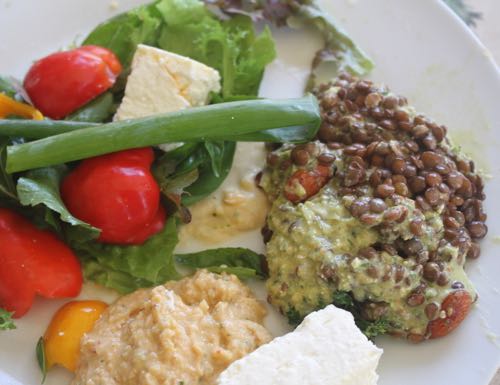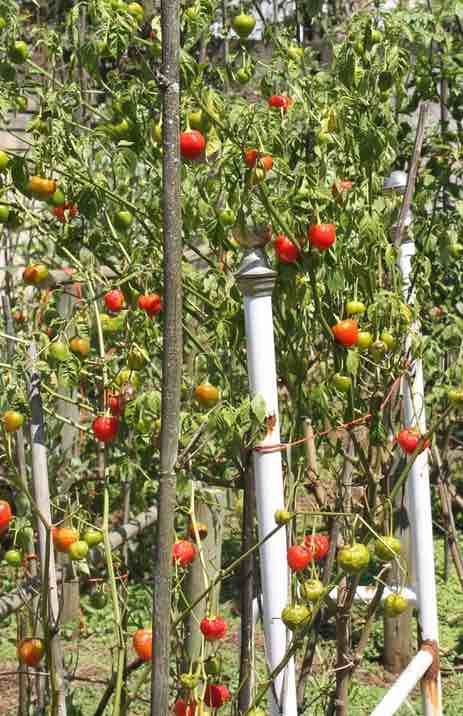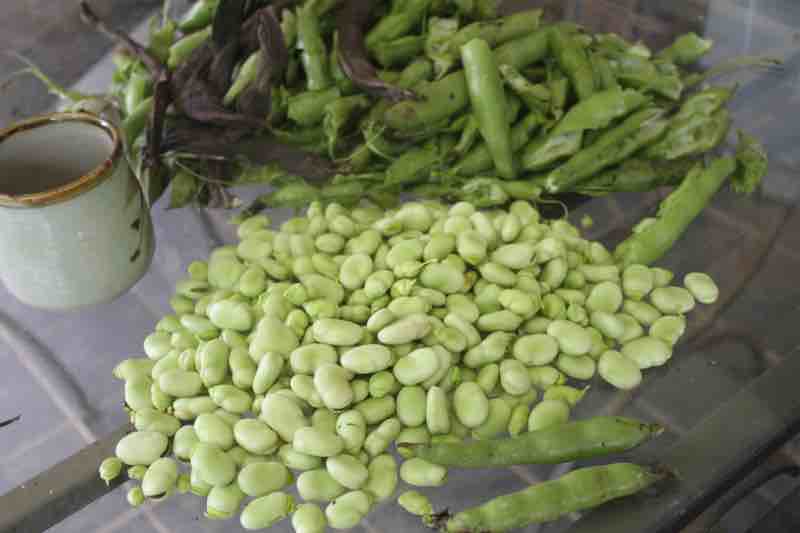Best way to cook lentils
The best way to cook lentils is just to boil them briefly in salted-water; then add a piquant sauce of some sort as they really have very little flavour.
I love lentils for many reasons but not least is that because they are so small, you can prepare a meal in under half an hour; with only perhaps ten-minutes of your time will you be actively busy. You can get on doing something else more interesting while they are cooking.
Lentils are for those who hate cooking but know they must eat nutritious nosh if they want to live long in the land. They are a "convenience food" that won't lead you down the path of pain and suffering.
However they are rather dull so I like to add a sauce just as they finish cooking. Would you enjoy spicy-lentils?
 Lentils, hummus and a mixed salad
Lentils, hummus and a mixed saladWith all the ketogenic diets about many folk are terrified of the carb in lentils. However let's get it straight; it is the refined-starches that are the killers. There is so much research confirming that we should be eating more legumes for protein. They are good for us and will not add to our waistlines.
The cancer associations recommend eating a legume at every single meal; I too have no desire to go out that way, long before my time. It's sheer misery; around one in six people.
It's that bread-roll and the sweet treats that we should be watching out for; that is where the danger lies. We all have to learn to bake with 100 percent real flour.
This really is the best way to cook lentils. Enjoy them without guilt.
Ingredients
- 2 cups of dried lentils, any colour
- 1 tsp salt
- A couple sprigs of thyme
Pick through your dried-lentils because alas they quite often may have a few small stones; you could break a tooth. Wash them once or twice to get off the dust of the fields.
Add the salt and thyme to a large pot and cover them with plenty of water; at least a couple of centimetres.
Simmer on low-heat for about twenty minutes.
Strain off the water and remove the thyme-stalk; return the hot lentils to your pot.
Even better
Consider cooking your lentils in a vegetable stock; it will greatly improve both the nutrition and flavour.
The sauce
Here you can let your imagination go wild. There are so many options; this is one.
- 50 ml olive-oil
- 10 ml of your favourite vinegar or lemon-juice
- 1/2 lime including the pulp
- Quarter of a de-seeded chili or four peppadews
- 1 tsp salt
- Optional: add a TBSP of tahini and 1 teaspoon of capers
Use a stick-blender to mush it up. Pour the sauce over your hot lentils. Serve them on brown rice; or use them on the side with a salad or even in a soup.
They will keep up to five-days in the fridge.

Peppadews are our favourite chili. They certainly have some sting but much less than those chilis we are accustomed to; and they are easy to grow.
How long do lentils last?
At a stretch you could keep your lentils in the fridge for a week but frankly I wouldn't go much over 4 days. I try to reduce the number of little sealed mystery-containers to a minimum. How often have you opened one of them and found it covered with mould?
This is the best way to cook lentils and it is so easy that we do not need to store them for ages. They will get eaten; take the cancer association's advice and have tablespoon or two with every meal.
General advice is to make sure you cook your dried lentils within 6 months of purchase.
Are lentils high in protein?
Roughly one-tenth of your lentil is protein. So half a cup, weighing about 100g will supply nearly a quarter of your daily needs; astonishingly that's more than the six grams in a large egg.
However it is not a complete protein; it's short on some amino acids like methionine and cysteine, unless you sprout the lentils first. Vegans get around this by adding tahini, a sesame-seed paste that you can get from your Greek and Turkish stores.
Otherwise just have an egg for breakfast with your lentils.
Another alternative is you could add this piquant tahini-sauce[1] after you have boiled your lentils.
It's astonishing how many people are using protein shakes and powders on their ketogenic and other diets; it is just another bad substitution for a wellness way of eating. And they are expensive; ultra-processed foods.
The reason diets almost never work is because they are not sustainable. Are you planning to have a shake for breakfast for the rest of your life? Definitely not but I absolutely love lentils and other legumes; we consume them daily.
You could readily use lentils instead of broad beans in Eggs Hilton; the perfect breakfast.
Some legumes do take longer to prepare; there's no sweat though about the best way to cook lentils. It is because they are so tiny.
At around R50 per kg (5 cups) containing 100g protein, lentils are one of the cheapest foods; and having them in the fridge you can snack on them without guilt if you are feeling peckish.
The best is their so-called "subsequent meal effect;" all day because of the hormone stimulation of the hunger centre, they continue to supply the satiety we need. One isn't constantly feeling famished and thinking about that next snack.
Are lentils high in starch?
They get a lot of stick from the keto folk. Are lentils high in starch?
Should we be avoiding them?
I have just measured out what I thought to be a reasonable helping; it came to almost 100g or 1/2 cup.
That would contain 20g of starch but 8 grams is fibre, so only 12 of net carbs; the digestible fraction that ends up as glucose in the portal system.
The fibre of course passes straight through the small intestine where absorption of starches occurs, ending up in the colon.
The glycemic index of lentils is 35[2]; very low. It has a minimal effect on blood glucose. However for those attempting to go into ketosis, 12g of net carbs at one sitting would be considered too much; so have 1/4 cup.
Do you understand the meaning of net carbs?
They are so quick to prepare; learn this best way to cook lentils.
Are lentils high in fibre?
Guidelines are that we should be consuming at least 30 grams of fibre each day from our food. It gives the stool bulk and provides nutrients for the teeming billions of bugs in the microbiome. The average person enjoying typical grocery store meals is eating about half of that; constipation and bowel-diseases are rife. The normal flora is being starved and inflammatory conditions prevail.
Nearly one-tenth of your lentils is dietary fibre; 8 grams /100g. So half a cup would provide nearly a quarter of your daily needs.
Are lentils high in fibre? Yes, they certainly are.
An alternative is our authentic hummus recipe; we always have a dish of one legume or another in our fridge to enjoy with our meals.
Choline
Choline is an "essential" nutrient, we cannot survive without it; it really should have been included in the B vitamin family. It's that important but 90% of people surviving on typical grocery store food are deficient[3]. Lentils are an excellent source.
"Betaine, a choline derivative, is important because of its role in the donation of methyl groups to homocysteine to form methionine."
- The Journal of Nutrition[7]
Toxic homocysteine build up in the liver and blood is the underlying cause of many chronic degenerative diseases. Most legumes like lentils are rich in choline; we should be enjoying one or another daily if want to enjoy a long life without medication.
Pulses
Pulses are the dried, edible seeds of legumes; so that would include any bean, pea or lentil. Personally I prefer where possible to enjoy them whilst still green; they take a shorter time to cook, are sweeter and have less anti-nutrients.
But I have never seen lentils before they have been dried; nor has google apparently. Their benefits arises when you've run out of green peas and beans.
So lentils are perfect for those who don't have a garden; or just need a quick, nutritious and wholesome meal.
The World Cancer Forum incidentally recommends a whole grain and a legume at every meal; like they do in India where a dal is often enjoyed three times a day.

If you enjoy legumes like these then most probably you have to spend the time growing and podding them. A big factor is just how anxious you are concerning all the vibe about anti-nutrients.
These green broad beans are a wonder and cook in just five minutes when they are young; and they have far less lectins than dried lentils.
Canada is the biggest producer of lentils, with India a close second. Have you ever seen them growing in a field or garden? Foods with tiny fruit are harder; like sesame seeds for example.
Man cannot live by bread alone, certainly the modern loaf but not with only lentils either; they are missing specific amino acids so are not complete as is an egg. They need to be complemented with other protein sources.
One can reduce the cooking time by a half by soaking them for several hours or overnight.
Pressure-cooking is only worthwhile if you are doing a large batch for the whole week. Add a touch of salt and even a little bicarb; the alkaline medium hastens breaking down the fibrous pectin.
When browsing use right click and "Open Link in New Tab" or you may get a bad gateway signal.
The material expressed on this page is gleaned from the nutritional and environmental literature; it is clearly referenced. A plain distinction is made between the author's opinion and that which is scientifically proven. When in doubt consult your health professional.
To suggest a correction or clarification, write to Dr Bernard Preston here. Contact.
Newsletter
Our newsletter is entitled "create a cyan zone" at your home, preserving both yourself and Mother Earth for future generations; and the family too, of course. We promise not to spam you with daily emails promoting various products. You may get an occasional nudge to buy one of my books.
Here are the back issues.
- Lifestyle and ideal body weight
- What are ultra-processed foods?
- Investing in long-term health
- Diseases from plastic exposure
- Intensive lifestyle management for obesity has limited value
- A world largely devoid of Parkinson's Disease
- The impact of friendly bacteria in the tum on the prevention of cancer
- There's a hole in the bucket
- Everyone is talking about weight loss drugs
- Pull the sweet tooth
- If you suffer from heartburn plant a susu
- Refined maize meal and stunting
- Should agriculture and industry get priority for water and electricity?
- Nature is calling
- Mill your own flour
- Bake your own sourdough bread
- Microplastics from our water
- Alternative types of water storage
- Wear your clothes out
- Comfort foods
- Create a bee-friendly environment
- Go to bed slightly hungry
- Keep bees
- Blue zone folk are religious
- Reduce plastic waste
- Family is important
- What can go in compost?
- Grow broad beans for longevity
- Harvest and store sunshine
- Blue zone exercise
- Harvest and store your rainwater
- Create a cyan zone at your home
Did you find this page interesting? How about forwarding it to a friendly book or food junkie? Better still, a social media tick would help.
Address:
56 Groenekloof Rd,
Hilton, KZN
South Africa
Website:
https://www.bernard-preston.com